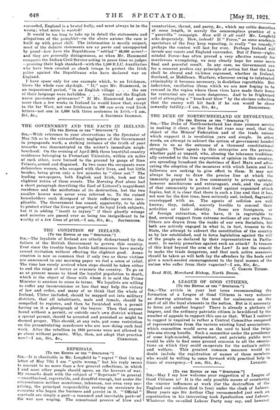REPRISALS.
(To THE EDITOR or THE " SPECTATOR.") Sia,—It is charitable in Mr. Longfield to " regret " that (in my letter of May 7th) I am " quite wrong," but his reply seems to amount to no more than a few general reflections, in which I and most other people should agree, on the horrors of war. My remarks dealt with the subject of "Reprisals" in general —unauthorised, regrettable, and dreadful enough, but under the circumstances neither monstrous, inhuman, nor even very sur- prising, the principal responsibility resting on messieurs les assassins who began the business and persist in it. " Official " reprisals are simply a part—a reasoned and inevitable part—of the war now waging. The sensational process of blow and counterblow, thrust, and parry, &c., which my critic describes at some length, is merely the commonplace practice of a " guerrilla " campaign. How will it all end? Mr. Longfield asks desperately. How, indeed? If " Force," as some academic spectators of the fray keep repeating, is really "no remedy," perhaps the contest will last for ever. Perhaps Ireland will invade our coasts and England surrender. But if Force—right- minded Force—has often proved a very effective remedy for murderous wrongdoing, we may clearly hope for some more final and peaceful result. In any case, no Government can for a moment profess any principle of action but that the Law shall be obeyed and viclence repressed, whether in Ireland, Scotland, or Middlesex. Warfare, wherever owing to infatuated criminality it becomes necessary, is doubtless regrettable. But indecision, vacillation (from which we are now hoping to be rescued in the region where these vices have made their home for centuries) are yet more dangerous. And to be frightened out of attempting a " knock-out blow " by the obvious reflection that the enemy will hit back if he can would be sheer


































 Previous page
Previous page